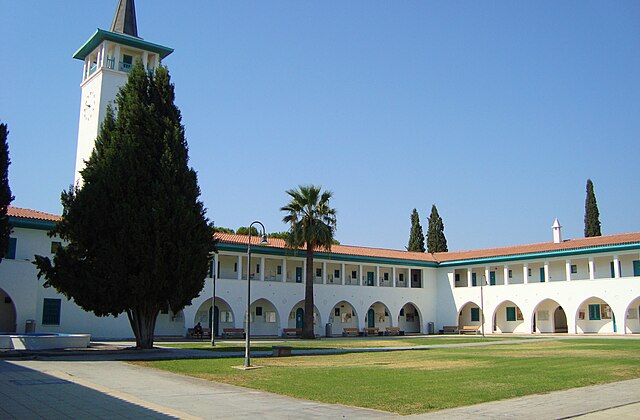Top Qs
Timeline
Chat
Perspective
Education in Cyprus
From Wikipedia, the free encyclopedia
Remove ads
Education in Cyprus is overseen by the Ministry of Education, Sports and Youth.[1]
The education system is divided into pre-primary education (ages 3–6), primary education (ages 6–12), secondary education (ages 12–18) and higher education (ages 18+).[2] Full-time education is compulsory for all children aged between 5 and 15.[3] State-provided schooling including higher education is paid for by taxes.
There is also a parallel system of accredited independent schooling, and parents may choose to educate their children by any suitable means. Private school and university fees are not usually covered by the state.
Higher education often begins with a four-year bachelor's degree. Postgraduate degrees include master's degrees, either taught or by research, and the doctorate, a research degree that usually takes at least three years. Universities require accreditation by the Cyprus Agency of Quality Assurance and Accreditation in Higher Education in order to issue degrees.
Remove ads
Primary education

In the 2017-2018 academic year, there were 334 primary schools with 56,700 students and 3,980 teachers.[4][5]
Secondary education

Higher education
Summarize
Perspective
Higher, or tertiary education is provided by a network of state and private universities and colleges. Private universities were first accredited in 2005 and require a special licence to operate and award degrees. This was set out in the 2005 Private Universities law.[6]
Currently the following universities have a licence by the Ministry of Education and Culture to issue academic degrees:
Public Universities

Private Universities
- Cyprus West University[7]
- European University Cyprus[8]
- Frederick University
- Neapolis University
- University of Central Lancashire Cyprus (UCLan Cyprus)
- University of Nicosia
- American University of Beirut – Mediterraneo Campus in Cyprus[9]
- Philips University
Private Institutions of Tertiary Education
- A.C. American College[10]
- ACC AKADEMIA COLLEGE
- Aigaia School of Art and Design
- Alexander College
- Arte Music Academy
- Atlantis College
- Casa College
- CBS – College of Business Studies
- C.D.A. College
- Church of Cyprus - School of Theology
- City Unity College Nicosia
- College of Tourism & Hotel Management
- Cyprus College
- Cyprus International Institute of Management
- Cyprus School of Molecular Medicine
- Frederick Institute of Technology
- Global College
- Institute of Professional Studies (IPS), UCLan Cyprus
- Intercollege
- InterNapa College
- KES College
- Larnaca College
- Ledra College
- Mesoyios College
- Neapolis College
- P.A. College
- Susini College
- The CTL EuroCollege
- The Cyprus Academy of Art
- The Cyprus Institute
- The Cyprus Institute of Marketing
- The Limassol College - T.L.C.
- The Philips College
- Vladimiros Kafkaridis School of Drama
Public Institutions of Tertiary Education
- The Higher Hotel Institute of Cyprus
- The Cyprus Forestry College
- The Mediterranean Institute of Management
- The Police Academy
- The School for Tourist Guides
- The Public School of Higher Vocational Education and Training (MIEEK)
Technical and Vocational Education and Training (TVET)
Technical and vocational training (TVET) addresses multiple demands of an economic, social and environmental nature by helping young people and adults to develop the skills they need for employment, decent work, and entrepreneurship, promoting equitable, inclusive and sustainable economic growth, and supporting transitions to green economies and environmental sustainability.[11]
The Human Resource Development Authority of Cyprus (HRDA) is the body in charge of managing training funds in Cyprus. The system relies on contributions paid by all employees, with the exception of the self-employed and government workers. By law the Human Resource Development Levy rate cannot exceed 1% of the emoluments paid to each employee. In practice, the levy rate is 0.5% of payroll, with a monthly cap of €4,533 (Regulation 509/2012).[11]
The HRDA issues grants to employers for approved training as well as allowances to trainees and financial assistance for obtaining training equipment. The HRDA subsidizes 80% of the cost of training, rising to 100% for ‘high-priority multi-company training programmes’.[11]
Remove ads
See also
References
Sources
External links
Wikiwand - on
Seamless Wikipedia browsing. On steroids.
Remove ads